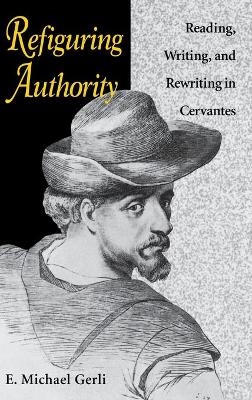
Refiguring Authority
Reading, Writing, and Rewriting in Cervantes
Seiten
1995
The University Press of Kentucky (Verlag)
978-0-8131-1922-9 (ISBN)
The University Press of Kentucky (Verlag)
978-0-8131-1922-9 (ISBN)
In this wide-ranging study E. Michael Gerli shows how Cervantes and his contemporaries ceaselessly imitated one another -- glossing works, dismembering and reconstructing them, writing for and against one another -- while playing sophisticated games of literary one-upmanship.
The result was that literature in late Renaissance Spain was often more than a simple matter of source and imitation. It must be understood as a far more subtle, palimpsest-like process of forging endless series of texts from other texts, thus linking closely the practices of reading, writing, and rewriting. Like all major writers of the age, Cervantes was responding not just to specific literary traditions but to a broad range of texts and discourses. He expected his well-read audience to recognize his sources and to appreciate their transformations.
The notion of writing as reading and reading as writing is thus central to an understanding of Cervantes' literary invention. As he created his works, he constantly questioned and reconfigured the authority of other texts, appropriating, combining, naturalizing, and effacing them, displacing them with his own themes, images, styles, and beliefs.
Modern literary theory has confirmed what Cervantes and his contemporaries intuitively knew -- that reading and writing are closely linked dimensions of the literary enterprise. Reading Cervantes and his contemporaries in this way enables us to cojnprehend the craft, wit, irony, and subtle conceit that he at the heart of seventeenth-century Spanish literature.
The result was that literature in late Renaissance Spain was often more than a simple matter of source and imitation. It must be understood as a far more subtle, palimpsest-like process of forging endless series of texts from other texts, thus linking closely the practices of reading, writing, and rewriting. Like all major writers of the age, Cervantes was responding not just to specific literary traditions but to a broad range of texts and discourses. He expected his well-read audience to recognize his sources and to appreciate their transformations.
The notion of writing as reading and reading as writing is thus central to an understanding of Cervantes' literary invention. As he created his works, he constantly questioned and reconfigured the authority of other texts, appropriating, combining, naturalizing, and effacing them, displacing them with his own themes, images, styles, and beliefs.
Modern literary theory has confirmed what Cervantes and his contemporaries intuitively knew -- that reading and writing are closely linked dimensions of the literary enterprise. Reading Cervantes and his contemporaries in this way enables us to cojnprehend the craft, wit, irony, and subtle conceit that he at the heart of seventeenth-century Spanish literature.
E. Michael Gerli is Commonwealth Professor of Spanish at the University of Virginia.
Introduction
Folk Images of Kentucky
Kentucky Words and Brief Expressions
The Yarnspinner in Kentucky
Folk History and Legends
Kentucky Singers
Folklore in Kentucky Literature
Summing Up
| Reihe/Serie | Studies in Romance Languages |
|---|---|
| Verlagsort | Lexington |
| Sprache | englisch |
| Maße | 152 x 229 mm |
| Themenwelt | Geisteswissenschaften ► Sprach- / Literaturwissenschaft ► Anglistik / Amerikanistik |
| Geisteswissenschaften ► Sprach- / Literaturwissenschaft ► Literaturwissenschaft | |
| ISBN-10 | 0-8131-1922-7 / 0813119227 |
| ISBN-13 | 978-0-8131-1922-9 / 9780813119229 |
| Zustand | Neuware |
| Haben Sie eine Frage zum Produkt? |
Mehr entdecken
aus dem Bereich
aus dem Bereich
Poetik eines sozialen Urteils
Buch | Hardcover (2023)
De Gruyter (Verlag)
CHF 83,90
Entzauberung und Faszination des Immergleichen in Literatur und Film
Buch | Softcover (2024)
Springer Fachmedien Wiesbaden GmbH (Verlag)
CHF 118,95
Buch | Softcover (2024)
belleville (Verlag)
CHF 27,95


